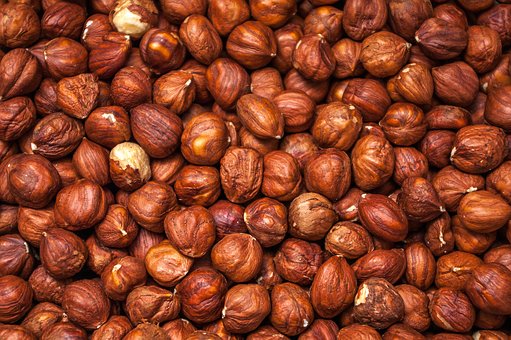Five Reasons to Eat Hazelnuts
© HealthyMuslim. See Terms and Conditions

1. They Contain Good fats
Hazelnuts are particularly high in omega-9 fatty acids. These healthy oils play an important role in balancing cholesterol in the body, as well as helping to lower blood pressure and offer protection against coronary heart disease and diabetes. Omega-9 fats contain oleic acid, the main oil found in olive oil, giving them the same heart-healthy, anti-inflammatory action as olive oil.
2. They're Rich in vitamins and Minerals
Hazelnuts are an excellent source of the antioxidant Vitamin E and a host of phytonutrients that benefit the immune system.
Hazelnuts have the highest concentration of folate among all the tree nuts. Folate reduces the risk of neural tube birth defects, and is linked to protecting heart health, certain cancers, Alzheimer's disease and depression.
Hazelnuts also contain the blood pressure-lowering minerals calcium, magnesium and potassium, and are a rich source of the amino acid arginine that relaxes blood vessels.
3. They're Rich in Phytochemicals
Snacking on hazelnuts fortifies the body with a variety of phytochemicals including proanthocyanidins, quercetin, and kaempherol. The proanthocyanidins are the same flavonoids that give green tea their health benefits. Proanthocyanidins have shown the potential to protect brain health, improve circulation, and even relieve allergy symptoms.
4. They're High in protein and fiber
Hazelnuts provide a high-quality source of protein and fiber. A cup of chopped hazelnuts has a whopping seventeen grams of protein and eleven grams of fiber. They're a good alternate protein source for those who don't eat meat, although other forms of vegetarian protein are needed to provide a complete source of essential amino acids.
5. They Can Potentially Reduce the Risk of Cataracts
A study in rats showed that hazelnuts prevented the formation of cataracts in rats. The cataract was induced by the administration of the chemotherapeutic drug doxorubicin. This protective effect was thought to be due to the natural antioxidants such as Vitamin E and other phytochemicals found in hazelnuts.
References
Bayer A et al. Doxorubicin-induced cataract formation in rats and the inhibitory effects of hazelnut, a natural antioxidant: a histopathological study. Med Sci Monit. 2005 Aug;11(8):BR300-4.
Link to this article: Show: HTML Link • Full Link • Short Link
Share or Bookmark this page: You will need to have an account with the selected service in order to post links or bookmark this page.





|
Related Articles:
- Five Reasons to Eat Hazelnuts
- The Omega Balance: Essential for Better Health
- Eating For Better Digestion
- Date and Pecan Balls With Coconut
- Eat A Range of Colorful Phytonutrient-Rich Foods For Optimum Health
- Five Beneficial Nuts to Add to Your Diet
- Nutrients and Superfoods for Healthy Skin
- Healthy Snack Ideas
- Eating Nuts Daily Can Boost Health
You must be registered and logged in to comment.
Most Popular
Latest Articles
Popular Subjects
Health, fitness and longevity
Based upon the principles of health
in the Qur'an and Prophetic Traditions.
HealthyMuslim.Com
There are two bounties in which
most people lose out: good health
and free time. Al-Bukhari.























